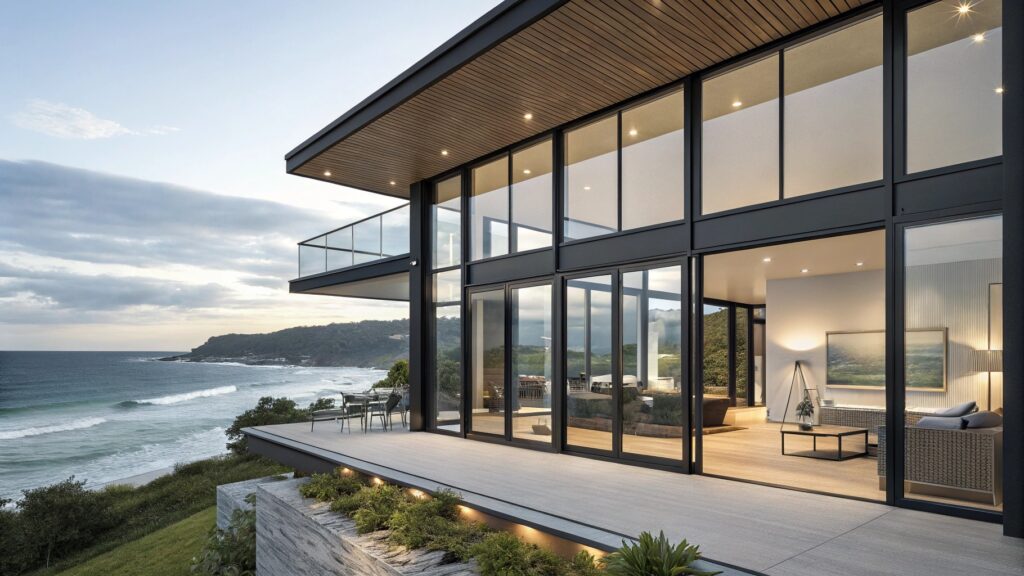
I’ve worked with many homeowners living by the coast—and one thing I hear again and again is this:
“The sea view is stunning, but the salty air is killing my windows.”
Living near the ocean is a dream for many, but it also brings real challenges—humidity, salt, storms, and intense sun. That’s why choosing the right windows matters more than most people think.
Are aluminum windows really suitable for coastal homes?
Yes, aluminum windows are a great fit for coastal homes. They resist corrosion, handle humidity and salt air, and maintain structural integrity in storms—especially when finished with powder coating or anodizing.
**when you choose the right materials, finishes, and installation. I’ll walk you through what to look for and how to make the smartest long-term choice.
🏡 Want Expert Advice on Coastal Windows?
👉 Click below to chat directly with me about your coastal project. I’m happy to answer questions about styles, materials, pricing, or delivery.
Why Is Aluminum a Great Choice for Coastal Areas?
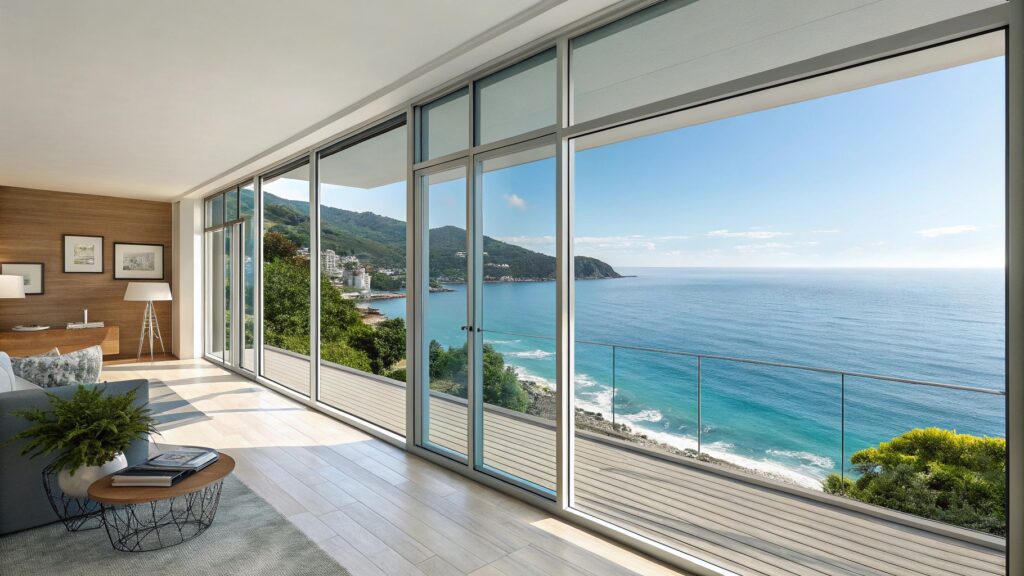
Aluminum is a good choice for coastal areas[^1] if it is protected with powder coating or anodizing, which prevent corrosion and extend its lifespan.
Aluminum vs Other Window Materials for Coastal Homes
| Feature | Aluminum | Vinyl | Wood |
|---|---|---|---|
| Corrosion Resistance | ✅ Excellent (with coating) | ❌ Poor in salty air | ❌ Prone to rot and warping |
| Strength & Wind Rating | ✅ High | ⚠️ Moderate | ❌ Low |
| Maintenance | ✅ Low | ✅ Low | ❌ High |
| Aesthetic Flexibility | ✅ Modern, sleek | ⚠️ Basic look | ✅ Warm, classic |
| Cost (Initial) | ⚠️ Medium–High | ✅ Low | ⚠️ Medium–High |
| Lifespan in Coastal Areas | ✅ 20+ years (with coating) | ❌ 8–12 years | ❌ 10–15 years |
Why Aluminum Works in Coastal Areas:
- Corrosion Resistance: Aluminum naturally forms a protective oxide layer, but additional coatings like powder coating or anodizing enhance its resistance to salt and moisture.
- Strength: Aluminum’s structural integrity makes it ideal for large windows that can withstand strong coastal winds.
- Low Maintenance: Unlike wood, aluminum doesn’t warp or swell in high humidity, making it a practical choice for seaside homes.
| Feature | Benefit in Coastal Areas |
|---|---|
| Corrosion Resistance | Prevents rust and salt damage |
| Strength | Withstands high winds and storms |
| Low Maintenance | No swelling, warping, or rot |
What Features Make Windows Ideal for Coastal Properties?
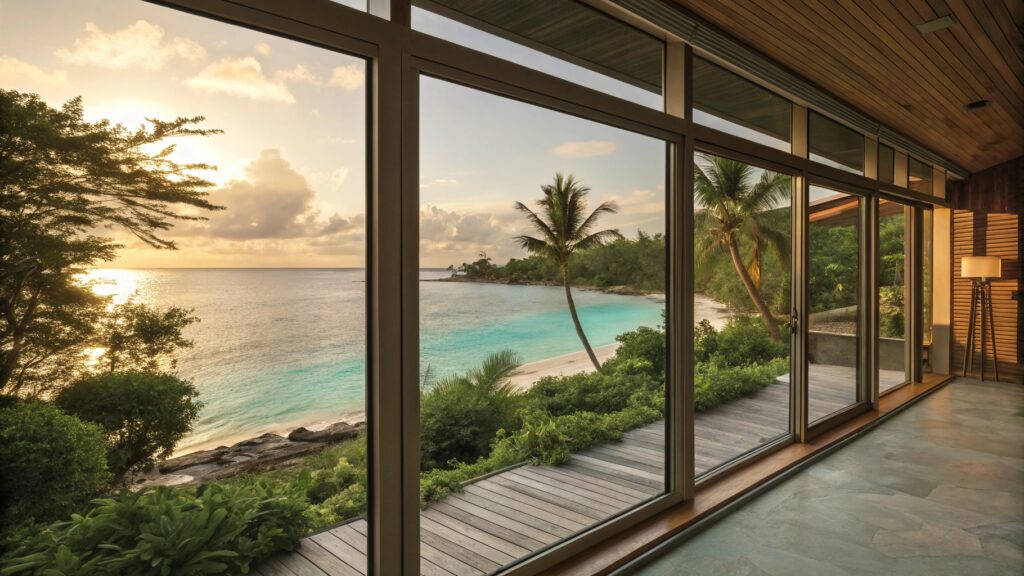
The best windows for coastal properties[^2] are aluminum windows with powder coating, impact-resistant glass, and thermal breaks for insulation.
Key Features for Coastal Windows:
- Powder-Coated Aluminum Frames: Resistant to corrosion and UV damage, ideal for salty air and strong sunlight.
- Impact-Resistant Glass: Protects against flying debris during storms and hurricanes.
- Thermal Breaks: Improve insulation by reducing heat transfer, keeping homes comfortable year-round.
- Sealed Edges: Prevent moisture from penetrating the glass and causing fogging or damage.
| Feature | Why It’s Ideal for Coastal Areas |
|---|---|
| Powder-Coated Frames | Corrosion and UV protection |
| Impact-Resistant Glass | Safety during storms |
| Thermal Breaks | Improved insulation and energy efficiency |
| Sealed Edges | Prevents fogging and moisture damage |
What Are the Downsides of Aluminum Windows—and How to Fix Them?
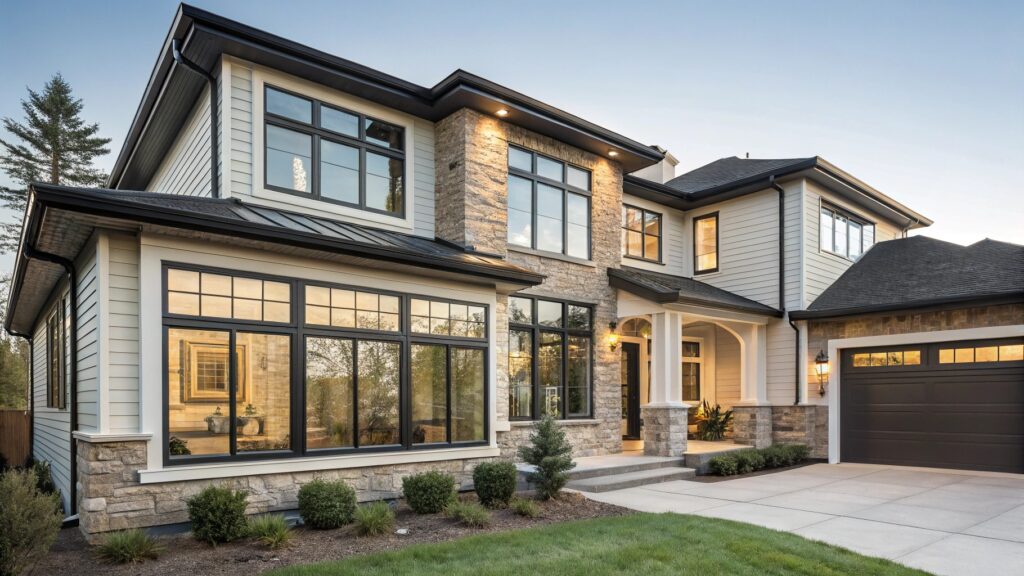
The main disadvantages of aluminum windows[^3] are their susceptibility to corrosion, higher cost compared to vinyl, and potential heat transfer if not thermally broken.
Common Disadvantages:
- Corrosion: Standard aluminum is prone to salt damage without protective finishes. Regular maintenance is necessary to avoid deterioration.
- Heat Transfer: Aluminum conducts heat, making homes less energy-efficient unless thermally broken frames are used.
- Cost: Aluminum windows are generally more expensive than vinyl options, especially when enhanced features like powder coating or thermal breaks are added.
| Disadvantage | Impact | Solution |
|---|---|---|
| Corrosion | Rust or pitting in salty air | Use powder-coated or anodized frames |
| Heat Transfer | Reduced energy efficiency | Install thermally broken frames |
| Cost | Higher upfront investment | Focus on long-term durability benefits |
Why Do Some Aluminum Windows Fail in Coastal Areas?
%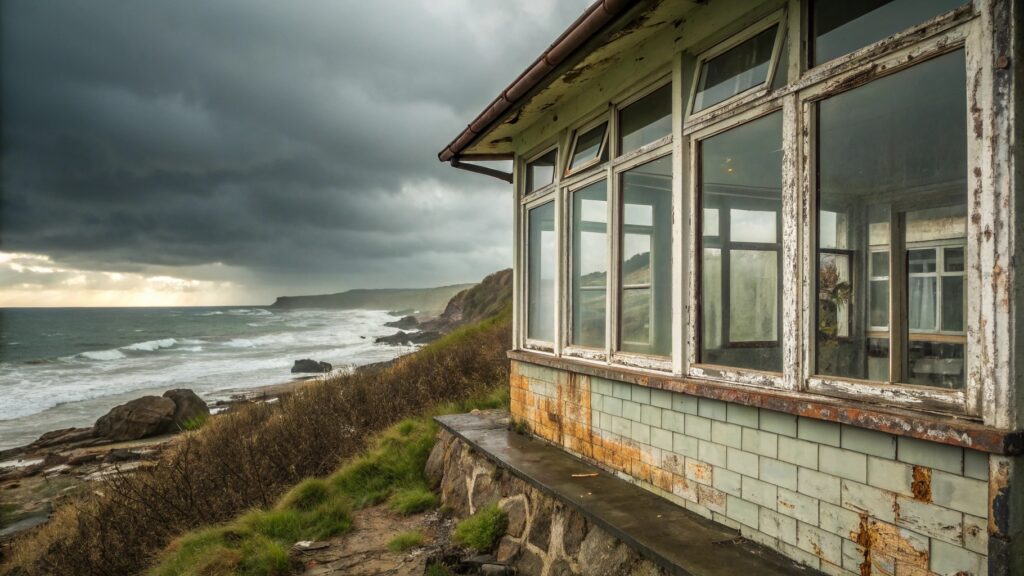
Aluminum windows are prone to failure[^4] due to corrosion, poor installation, or lack of protective finishes in coastal environments.
Causes of Failure in Coastal Areas:
- Corrosion from Salt Exposure
Without protective finishes, salt can accumulate on aluminum frames, leading to pitting and weakening the structure over time. Regular cleaning and powder-coated finishes are essential to prevent this. - Improper Installation
Poor sealing during installation can allow moisture to seep into the frames, causing internal damage and reducing the lifespan of the windows. - Low-Quality Materials
Cheaper aluminum frames without anodizing or powder coating are more likely to fail in harsh environments.
| Cause of Failure | Impact | Solution |
|---|---|---|
| Salt Exposure | Leads to pitting and structural weakness | Use high-quality finishes, clean regularly |
| Poor Installation | Moisture intrusion, damage over time | Hire experienced installers |
| Low-Quality Materials | Reduced lifespan, increased maintenance | Invest in premium aluminum frames |
Frequently Asked Questions About Coastal Windows.
Are aluminum windows better than vinyl for coastal homes?
Yes—aluminum is stronger, more durable in salty air, and doesn’t warp. Vinyl may crack or degrade over time in extreme climates.
Do aluminum windows corrode near the ocean?
Untreated aluminum can corrode, but powder-coated or anodized frames resist salt and humidity effectively.
Can aluminum windows withstand hurricanes or storms?
Impact-rated aluminum windows with laminated glass are excellent for high-wind zones and meet coastal building codes.
How often should I maintain aluminum windows in coastal areas?
Clean the frames and hardware every 3–6 months to remove salt buildup. A quick rinse with fresh water is often enough.
Is triple glazing necessary near the ocean?
Not always. Double glazing is usually sufficient, but triple glazing may improve insulation and soundproofing in busy or windy areas.
Do aluminum windows look modern or traditional?
Aluminum frames offer a sleek, minimalistic look—ideal for modern and coastal homes seeking expansive glass and clean lines.
🪟 Ready to Upgrade Your Coastal Windows?
👉 Let’s talk about your project. Message me on WhatsApp for styles, sizing, or shipping advice.
Conclusion
Aluminum windows are one of the best choices for coastal homes—if finished properly and installed with care. In my experience, they outperform vinyl and wood in terms of durability, salt resistance, and long-term value. If you’re near the ocean and want modern looks with minimal maintenance, aluminum is the safest long-term bet.
[^1]: Why aluminum is a good choice for coastal areas with proper finishes.
[^2]: Features of the best windows for coastal properties, including impact-resistant glass and powder-coated frames.
[^3]: Disadvantages of aluminum windows and solutions for coastal environments.
[^4]: Causes of aluminum window failures and preventative measures for long-lasting performance.
